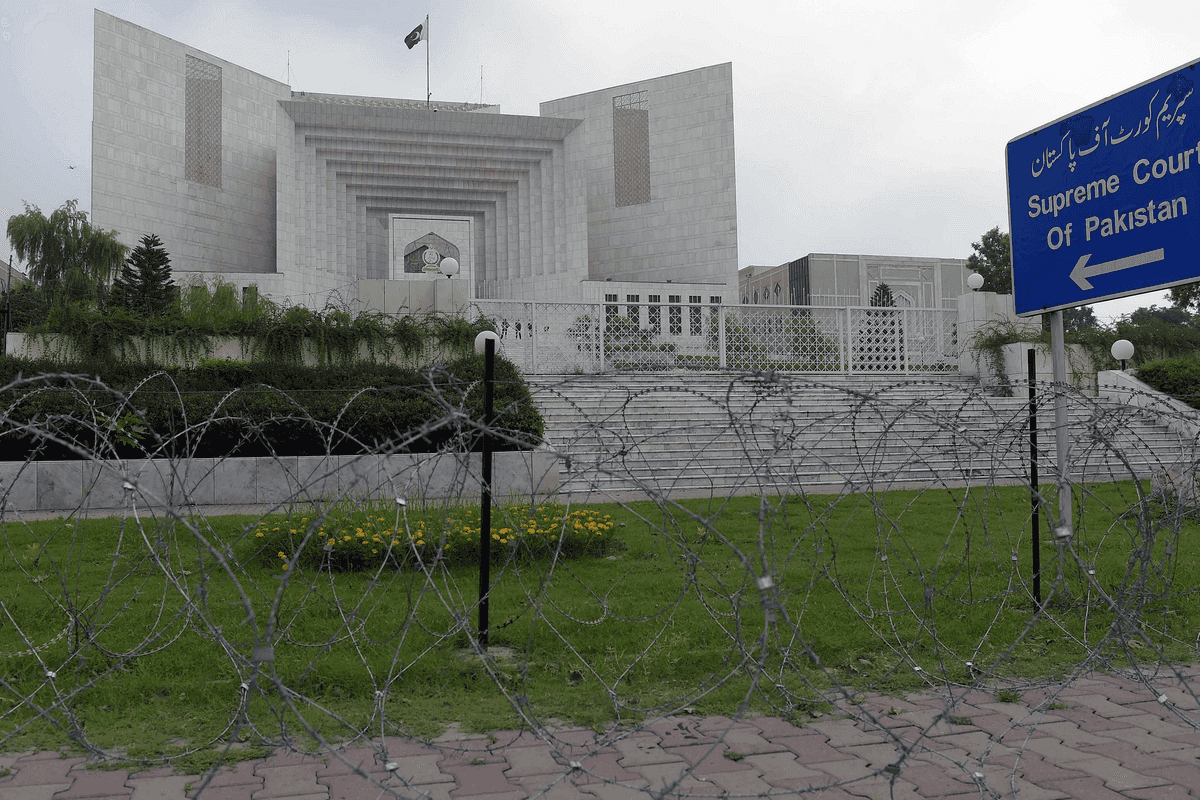Pakistan top court says president’s power to transfer judges bound by Constitution
Supreme Court hears judges' transfer case, issues notices to president, federal government, and acting IHC chief justice

Aamir Abbasi
Editor, Islamabad
Aamir; a journalist with 15 years of experience, working in Newspaper, TV and Digital Media. Worked in Field, covered Big Legal Constitutional and Political Events in Pakistan since 2009 with Pakistan’s Top Media Organizations. Graduate of Quaid I Azam University Islamabad.

A judge of Pakistan’s Supreme Court observed on Monday that while the president holds the authority to transfer judges, it must be exercised within constitutional bounds.
Justice Muhammad Ali Mazhar made this observation during the Supreme Court's hearing of petitions challenging the recent transfers of judges to the Islamabad High Court, a move opposed by several sitting IHC judges. The court, however, declined to immediately suspend the transferred judges from performing their duties.
The five-member bench, led by Justice Mazhar and comprising Justices Naeem Akhtar Afghan, Shahid Bilal, Salahuddin Panhwar, and Shakeel Ahmed, heard petitions filed by IHC Justices Mohsin Akhtar Kayani, Babar Sattar, Tariq Jahangiri, Saman Rafat, Sardar Ejaz Ishaq, and the Karachi Bar Association.
How it started?
The controversy stems from the February transfers of Justices Sardar Mohammad Sarfraz Dogar from the Lahore High Court, Khadim Hussain Soomro from the Sindh High Court, and Muhammad Asif from the Balochistan High Court to the IHC, which led to a reshuffling of the seniority list.
Justice Dogar’s appointment as senior puisne judge positioned him as acting IHC chief justice after Justice Aamer Farooq’s elevation to the Supreme Court -- prompting objections from sitting IHC judges, who claim the transfers breach constitutional guidelines and undermine their seniority.
The hearing
Today, the top court held the first hearing of the case. Justice Muhammad Ali Mazhar, heading the bench, noted that seven related petitions were before the court, including one jointly filed by five IHC judges objecting to the seniority of the transferred judges.
Justice Naeem Akhtar Afghan raised a constitutional query, questioning whether the law establishing the IHC permits transfers or only fresh appointments.
Representing the petitioning judges, senior lawyer Muneer A. Malik argued that the IHC law allows only new appointments and highlighted that the judges’ oath specifically refers to the Islamabad Capital Territory.
Justice Mazhar questioned whether seniority should reset if a judge takes a fresh oath upon transfer, as it could nullify prior service.
Malik maintained that transfers require a judge’s consent and the approval of both the transferring and receiving chief justices, along with the Chief Justice of Pakistan, as per Article 200. Justice Mazhar clarified that while the president has the authority to transfer judges, it must be exercised within constitutional limits.
Karachi Bar Association’s lawyer Faisal Chaudhry also urged the court to bar the transferred judges from assuming duties.
Notices issued to president, others
Justice Mazhar remarked that judicial seniority, unlike in civil service, isn’t governed by service rules and questioned whether it carries over from the previous court or restarts. Malik reiterated that the petitioners object to both the transfers and the resulting disruption in seniority.
After hearing arguments, the court issued notices to the president, the federal government, and the acting IHC chief justice, but declined to bar the transferred judges from performing their duties.
Justice Mazhar concluded, “The Constitution does not differentiate between temporary or permanent transfers—only that the President, with due process, may transfer a judge.”
The next hearing of the case is set for April 17.
The petition
Five sitting judges of the IHC had filed a petition in the top court to resolve a seniority dispute after judges from other provinces were transferred to the IHC.
Filed under Article 184(3), the plea seeks to restrain the transferred judges from performing judicial and administrative functions. It also requests the SC to declare that Acting CJ Sardar Muhammad Sarfraz Dogar, Justice Khadim Hussain Soomro, and Justice Muhammad Asif cannot be considered IHC judges until they take a fresh oath under Article 194, read with the Third Schedule.
The petition argues, citing Supreme Court (SC) precedents in the Aslam Awan and Farrukh Irfan cases, that inter se seniority—the order of seniority among individuals within the same group, service, or rank—should be determined from the date of oath as IHC justices, placing the transferred judges lower than the petitioners.
It calls for the SC to set aside the Feb 3 seniority list and the Feb 8 representation decision by former CJ Aamer Farooq, terming them illegal and contrary to settled law. It also challenges the JCP’s consideration of the faulty list during its Feb 10 meeting and urges the SC to invalidate the Feb 12 notification appointing Justice Dogar as acting CJ.
The plea requests a revised seniority list from the IHC registrar and argues that reconstitution of the Administration and Departmental Promotion Committees violated legal norms.
The petition stresses that oaths taken in one high court cannot be treated as valid for another, and treating transferred judges as IHC judges without a new oath violates Article 194. It further argues that these actions undermine IHC’s autonomy and the constitutional framework of federalism by assuming a “unified federal judicial cadre”, which does not exist.







Comments
See what people are discussing